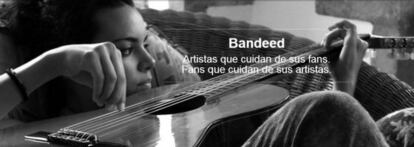Echoes of a future culture
Ibero-American entrepreneurs present their innovative ideas for distributing creative works

Claudia and Pablo used virtual money to buy tickets to see their favorite band, whose members wrote their biggest hits using a cellphone application, then instantly registered the rights on the internet.
The concert was made possible through crowdfunding, and several members of the audience helped decorate the stage with items they purchased from artists and artisans on their own mobile devices.
After the show, Claudia and Pablo went on a city tour using the video recommendations of previous visitors, and stopped in front of a colonial home whose façade was being used as a screen for a video installation about the region's historical heritage.
The above paragraphs offer a vision of a future already underway at the 5th Ibero-American Culture Congress in Zaragoza. Organized by the Education, Culture and Sports Ministry and the General Secretariat for Ibero-America - an international organization headquartered in Madrid - the convention drew nearly 200 internet experts on cultural affairs from Latin America, as well as the United States, Britain, France and Switzerland, all of whom discussed their own successful experiences in the field.
Aged between 20 and 30, they are seeking to carve out a niche in the digital world
Among the speakers were 21 young entrepreneurs from as many Ibero-American countries, who are sowing the seeds of culture in cyberspace. All aged between 20 and 30, they are seeking to carve out a niche in the digital world with ideas aimed at creators, distributors and consumers of culture.
These include things such as virtual money to buy items like movie or concert tickets. Kurtú is the name of the currency put into circulation by Paraguayan Alejandro Manuel Valdez and a team of six others. Under the scheme, companies assign a percentage of the price of their products (milk, soft drinks, cookies...) to kurtús. Each product represents a certain amount of kurtús that the user accumulates, before checking the virtual platform to see what they can buy with them.

Another of the proposals presented was Bandeed, a platform created by Spaniard Antxo Armada to offer live acts on demand via crowdfunding - a place for artists, fans and venues to support live music.
Meanwhile, Morph-On is a system created by Didier Cabrera of Honduras that aims to help artists improve their own creativity and digital presence. Using the platform, audiences can become co-authors by helping do things such as designing the stage for a musician's performance with a few clicks.
Mindscore allows people unable to read sheet music to write their own scores
This musician could well have written his or her songs using a cellphone application developed by Chilean Felipe Peña that allows people unable to read sheet music to write their own scores. To use the Mindscore app, all you need to do is make up a song by ear, sing it, record it, and the program decodes the tune.
The aim of Mexican Aldo Arce's Semillas Culturales Digitales platform is to help smalltime artisans sell more of their creations. It works as a kind of global shop window and sale point for their products, with the creators getting the money via their cellphones.

Meanwhile, Jorge Bejarano is sowing seeds against violence in Medellín, Colombia, with Puerto MAMM, a place where creators and the community work with digital tools to redirect negative human energy in the city using educational spaces and activities. The team hopes to take the project to other Latin American countries, creating a LabSurLab.
In El Salvador, Germán E. Hernández is helping educate people about local heritage with Teatro Líquido, an initiative to create documentaries and project them as video installations on the walls of landmark buildings.
An alternative to traditional travel guidebooks, Viajo SP is a video guide thought up by Brazil's Amanda Rodrigues. It allows tourists to consult videos made by other people and view their recommendations as to what to see and do at a given destination.
Of course, ideas and creations need to be copyrighted to prevent piracy. Creanexus offers just that, establishing a global system to progressively automatize the licensing process, explains Uruguay's María Balsa.
Tu suscripción se está usando en otro dispositivo
¿Quieres añadir otro usuario a tu suscripción?
Si continúas leyendo en este dispositivo, no se podrá leer en el otro.
FlechaTu suscripción se está usando en otro dispositivo y solo puedes acceder a EL PAÍS desde un dispositivo a la vez.
Si quieres compartir tu cuenta, cambia tu suscripción a la modalidad Premium, así podrás añadir otro usuario. Cada uno accederá con su propia cuenta de email, lo que os permitirá personalizar vuestra experiencia en EL PAÍS.
¿Tienes una suscripción de empresa? Accede aquí para contratar más cuentas.
En el caso de no saber quién está usando tu cuenta, te recomendamos cambiar tu contraseña aquí.
Si decides continuar compartiendo tu cuenta, este mensaje se mostrará en tu dispositivo y en el de la otra persona que está usando tu cuenta de forma indefinida, afectando a tu experiencia de lectura. Puedes consultar aquí los términos y condiciones de la suscripción digital.








































